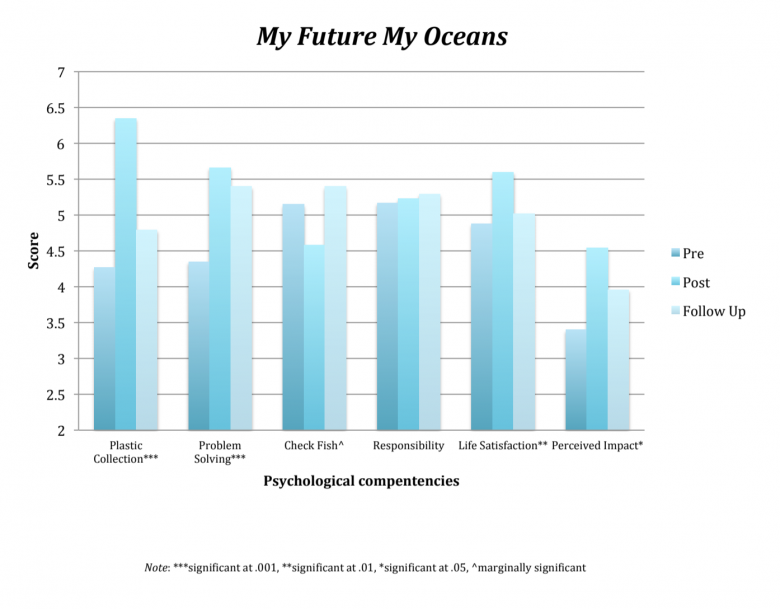-web_780_520_90.jpg)
My Future, My Oceans local and international team members with village heroes at Bontolebang, Selayar, Indonesia (photo: L Izquierdo)
Low-cost tool empowers leaders, promotes change
December 19 2017
New research has confirmed that shifts in human psychology and behaviour achieved by CCRES’ low-cost behaviour change program, My Future, My Oceans, last May have been sustained.
The research, undertaken at the project’s pilot site, Selayar, in Indonesia, during September, found that participants improved on the six core psychological competencies targeted by the pilot program.
The 48 participants – all adult women from the village of Bontolebang on the island of Pasi Gusung – also scored higher on an empowerment index than those from a control village.
Four months after the program began, not only are the women continuing to collect plastic – the primary behaviour targeted – they are making other positive changes to how they live their lives.
These changes include convincing their fishermen husbands to collect marine plastic, managing roaming goats (and thus their excrement) and collectively getting centralised electricity.
During the program participants – who researchers described as ‘village heroes’ – collected 100 bags of plastic rubbish that littered their village as a part of their ‘behavioural homework’.
“The village heroes extended what they learned to other dilemmas they encounter habitually, meaning we’ve implemented an intervention ‘Swiss-army knife’ of sorts,” said My Future, My Oceans project coordinator PhD student Erik Simmons, from The University of Queensland, Brisbane.
My Future, My Oceans is a tool for local governments and NGOs to use to promote positive behaviours, including waste management, fishing practices and personal hygiene, in coastal communities.
“The total cost to roll-out My Future, My Oceans in a coastal community is $AUD2,648. This includes all materials and personnel – exhibiting low-cost in a development setting,” said Erik.
Recently Bontolebang was nominated as a ‘Desa Sehat’ (Clean Village), one of the cleanest, healthiest villages in South Sulawesi Province. The village had never been nominated before. These villages from the 34 provinces in Indonesia are considered for an award by the National Government.
“Since the program (My Future, My Oceans) was delivered, many people from the Regency (of Selayar) and other villages have come to see what we have done,” said a Bontolebang participant.
Says another village hero: “This program has been excellent. We have been able to solve a variety of problems – rubbish, for example – and we’ve been able to do this together, and improve our family relationships as well.”
My Future, My Oceans has been created to promote human behaviours that protect coastal ecosystems and, in doing so, sustain the value of the services these ecosystems provide to local communities.
For the pilot at Bontolebang, the core psychological competencies and behaviours targeted were perceived plastic collection; problem solving skills; checking whether the fish participants consumed were caught safely or by destructive methods; perceived responsibility for the state of the environment; life satisfaction; and perceived impact of actions on the environment.
Essential to the success of My Future, My Oceans are the behavioural examples given to participants. These examples – safe and relatable illustrations of how to apply given psychological competencies in any context – include setting positive goals, buying safe fish, solving problems harmoniously and listening actively. These examples are associated with various psychological skills in different modules of a two-day workshop attended by the participants.
“The latest research shows the initial results, in regards to psychological competencies and behaviours, enhances the capacity of local leaders in a low-cost and sustainable way,” said Erik.
“Beyond the measured success of My Future, My Oceans, project logistics and viability were always top-of-mind. Not only did we want to develop a tool that could catalyse change, we wanted an intervention that would be sustainable and affordable for use in low-resource situations.
“My Future, My Oceans is effective, easily-generalisable and low-cost. This ensures that non-experts are capable of delivering the program with light-touch training and little community investment.”
More information: Erik Simmons

My Future, My Oceans increased six psychological skills and competencies across three time points, supporting a cleaner environment and a healthier community.


-web_780_520_90.jpg)

